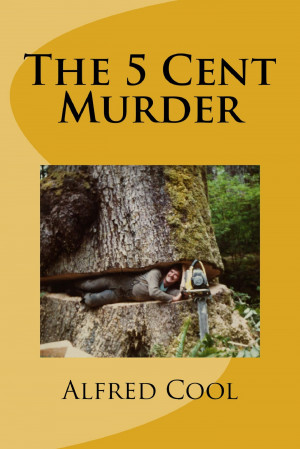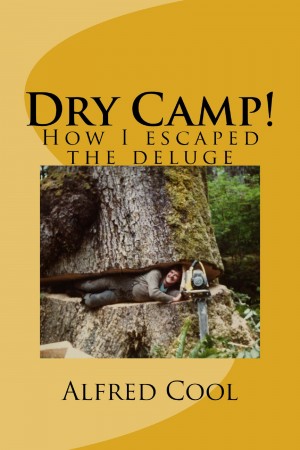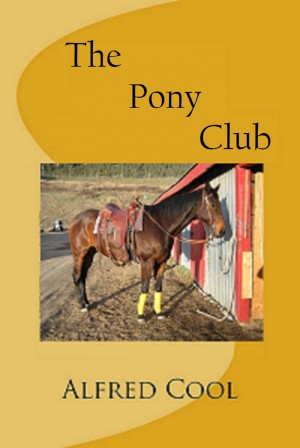Interview with Alfred Cool
Published 2017-10-24.
What do your fans mean to you?
Credibility and connection -- I don't need to elaborate, do I?
What's the story behind your latest book, THE HOTTEST PLACE ON EARTH?
Canada, Russia, and Australia are the world's worst nuclear polluters, and things have only been getting worse. "THE HOTTEST PLACE ON EARTH" -- in 1975, I returned from the Costa del Sol broke and tanned, and needing a summer job to pay for Journalism classes. I found a job in Port Radium, NWT, at what I thought was a silver mine but which turned out to be a Uranium mine -- a dirty, dangerous site. Canada was and still does sell itself as a "clean" nuclear retailer and we still spread the poison on a global scale. What I saw at Port Radium was far different from Canada's mirage of smooth, techno-propaganda. So, I published "THE HOTTEST PLACE ON EARTH" because uranium is dangerous: mining it, using processing it, using it, disposing of it. Creating nuclear power is by far the most expensive and inefficient use of resources in the world and the waste it generates is the worst polluting outrage on the planet. The impact of that time in my life lives with me still, and I write about things I know ...
Why do you write cross-over genre, where autobiography and non-fiction end up fiction?
I think the writer's connection to the world and his readers is truth; so I write the truth, but then something happens in the creative process that I release into the wild -- the characters demand equal free time and I let them go to be who they are within the context of the novel. It is a writer's indulgence and if it's done right, I enjoy every minute of the journey.
What inspires you to get out of bed each day?
I love to write -- I start every day at the keyboard, usually for 4-6 hours, then research, exercise, reading ... it is a life I wanted since I was 10 years old; it's not easy to acquire, but I really wanted this and found a way to achieve it.
What are your five favorite books, and why?
I don't have favorite books, or maybe all the books I have ARE my favorites!
I've changed throughout my life, growing, learning, winning & losing, having a child, experiencing new things or old things again, so my tastes have changed. I do have a stock of favorite authors and genres I return to often: Orwell -- his use of language is old school and amazing; always the American Romantics, perhaps especially Poe; the British writer, Tom Sharp, is hilarious; I like history and non-fiction, Pierre Burton can be pleasant and his research is flawless; but I am disappointed by many modern writers, so I don't read them as much as my agent/mentor says I should; I am a McKee devotee, his "Story" is brilliant, experienced, fun, and has the voice that speaks to me in such a way that I am almost afraid to read him too much and dull the inspiration. Yes, I've run the gamut on Hailey, Cromwell, Asimov, Clarke, Robbins and a dozen mystery/thriller writers, such as Flynn, King, Child, Robb, le Carre, Ludlum, Brown, but stop short of E. L James. I have enjoyed the likes of Faulkner, Wordsworth, Coleridge, Eliot, Shelly, Joyce, Hemmingway, Steinbeck, Kerouac, et al.
What is your writing process?
Inspiration, effort, story, edit-edit-edit until I get it right, publish. I use a dozen programs to massage the work-in-progress into ebook or paperback formats. But if you're asking which version of the story or novel is the most enjoyable to write, it is the first draft. After that, it becomes a battle between maintaining inspiration, tone, and style in the text and throughout the editing levels. At the end of the process, when I have decided to publish and the various ebook sites accept the formatted project, I do feel a thrill that lasts, perhaps, for as long as a day -- then I'm onto the next project. I do maintain 2-3 projects in progress at all times, and I have a "wish list" of future projects I daydream about (and sometimes work on secretly late at night), which is not a distraction, but helps me remain motivated to finish the current project.
Describe your desk
Maple hexagonal kitchen table, Easyboy Captain's chair, wireless keyboard/mouse, room for paper or cat to sprawl, grammar book, two 32" TV monitors because I hate squinting or popping windows back and forth and use the internet, my email, FB, and Word a lot; I have a microphone, charging cell phone, a land-line phone, have backup memory sticks and docking station so I can grab the laptop and go when I want. I can see the wide-screen TV, and have surround sound, a Microsoft HD camera, and Blue golfball mic for Skype, a set of pens and paper at the ready. My desk is in the living room but I am behind the 2 monitors 7+ hours a day.
Do you remember the first story you ever wrote?
Yes, grade 9 English ... for some reason the novel about the "Titanic" we were reading for English class did not have the right dialogue in it for me. I watched the 1953 version on TV the same week, so I wrote my own dialogue for Barbara Stanwyk's role in one scene, akin to what would be considered flash fiction today. My effort was noticed by the substitute teacher, who graded me with an "A." She talked with me after school about becoming a writer -- she was the second person to push me, the first was my mother.
Where did you grow up, and how did this influence your writing?
Here, and rural Victoria BC, then Vancouver when I was 9 years old. Until Vancouver, my life was idyllic and I was influenced by Nature and farms, my grandparents, my parents and three sisters, and cousins and aunts and uncles, too. For a while, we all lived together on the same farm. The ocean was and is always a part of my soul -- was my first powerful connection to a life of adventure that existed outside my parent's influence. Vancouver was fighting, bullies, parents in distress and passing it on to us, failures at school, painful dissolution of the family, and my having to leave the home at an early age in order to survive -- I don't think that's an exaggeration. Self-reliance is a recurring theme in my novels, anti-authority, recalcitrance, as well. But so is humor, which came from the family home.
When did you first start writing?
I always thought I would write, relied on the thought, actually. I scratched out letters whenever I was away from home, from as early as 7 years old when I was visiting relatives during the holidays. I have some of those letters still. I went to university as an English undergrad. Most of what I wrote then was naive and bad, but I still read some of it from time to time as a milestone check. One short story I wrote then, "Victory Square" was published recently in an ezine in Toronto, so it was not all bad writing. Nine years ago, my life simplified painfully, and I was free to pursue what I wanted, so I took up the pen and have not put it down since. I consider that time the beginning of my writing career, so 2007.
Do you remember the first story you ever read, and the impact it had on you?
The first significant reading I did on my own was the "Hardy Boys: The House on the Cliff." I read half the book after school one day -- shocking myself. I don't know what possessed me that afternoon, but I was bewitched and ravenous for more! The thing that got to me, which I have still, is that reading for pleasure was something I discovered/learned by looking for adventure, and it was something that I could do, was good at, and enjoyed! I recall feeling fantastical about the magic of chapters building into a connected story and the cathartic (did not know the word but got it anyway) feeling of solving a novel mystery. There was a true transfer of wonder that day, and I've been an avid reader ever since.
When you're not writing, how do you spend your time?
I live in a remote part of BC, on Vancouver Island, so I spend my time outside every day for at least a part of the day.
How do you discover the ebooks you read?
Recommendations, mostly, or stumble across a topic on the internet. I spend much of every day working in front of a computer screen, and I was a computer geek for most of my former career, so because I am recalcitrant first, I am more motivated to read paperbacks. Also, I enjoy the feel of the book in my hands and like to see it on my shelves.
What do you read for pleasure?
History, mountaineering non-fiction, Tom Sharpe, Orwell, pulp fiction
What book marketing techniques have been most effective for you?
None. A few years ago, I put $8,000 into a NY publishing firm and got 2 interviews and a few requests for free books out of it. So, though it was a waste of good money, I learned something from it and that won't happen again until the time is right. Besides, isn't the best marketing technique having a product people want, and getting it out there. And there is the issue of timing, as well ...
What motivated you to become an indie author?
I am an adult child of an alcoholic, so I was afraid I would not complete my first effort. I wanted to see my novella in print, and I found the fastest way to reaffirm myself was indie authorship. Since then, 2011, I have finished 7 novels. I was influenced by a family member to look into indie publishing because of the royalty benefits as well. However, the downside is that the author must rely on himself to market the project ... always the marketing (sigh) ...
How do you feel about commercial writing today?
Adverbs do not need to be picked on any more than too many participle phrases or bad grammar or a myriad of issues that abound in today's publishing. The fix for the first two sentence elements is better writing, style, and discretion, which is also better writing. Being "artistic and creative" and not knowing basic grammar is unacceptable. The basic tools of the trade include grammar and punctuation, spelling, POV, phrasing, etc. It behooves the professional writer to attain a higher level of utility with the entire toolbox before he/she eschews the building blocks of written communication. After some seasoning, perhaps after the 10th screenplay, years of writing poetry, or 10 novels, one may consider the ungrammatical narrator, but until then the writer will be judged as petulant and immature ... yes, I said it!
Smashwords Interviews are created by the profiled author or publisher.
Books by This Author
The 5 Cent Murder
by Alfred Cool
Price:
$9.99 USD.
Words: 116,530.
Language:
English.
Published: December 20, 2016
.
Categories:
Fiction »
Biographical
Run or Die! A chokerman in a remote logging camp must protect his sweetheart, Carleigh, from a dangerous serial rapist, Rove Der, in camp on a work-release program. The story unfolds in full local color, giving the reader a taste of the extreme danger and outrageous humor, the elixir, of Canada’s west coast loggers.
Dry Camp!
by Alfred Cool
The year is 1977. Over 7 days in October, this true-story, first person narrative takes place on the central coast of BC. During a record month of storms, the action picks up when the 2 spirited BC boys blitz across hundreds of kms of dangerous back roads to get to the closest cold beer store.
The Pony Club
by Alfred Cool
The seemingly pastoral bliss of Noble, a small interior BC town, explodes into scandal and outrage when the arrival of the Lipizzaner stallion show disrupts the quaint style and day-to-day living of the local Pony club membership.



